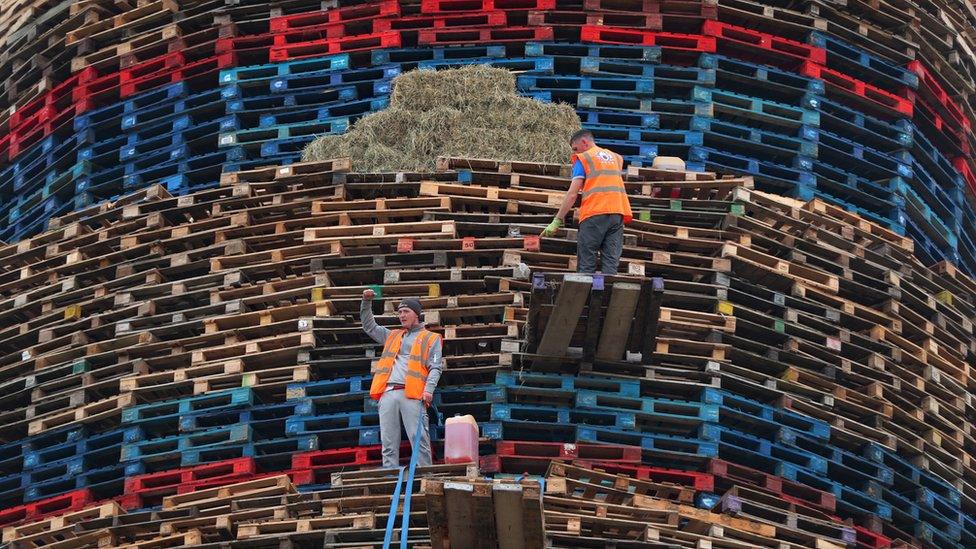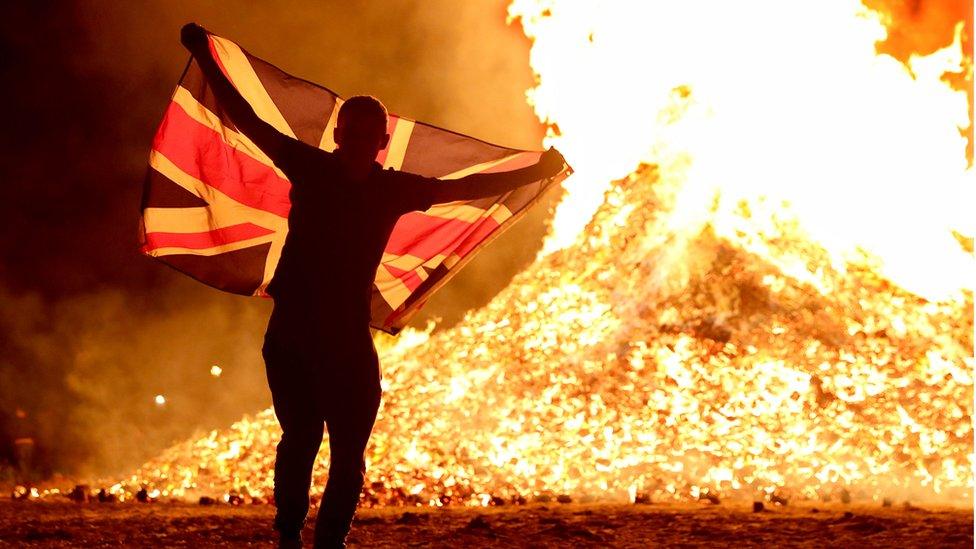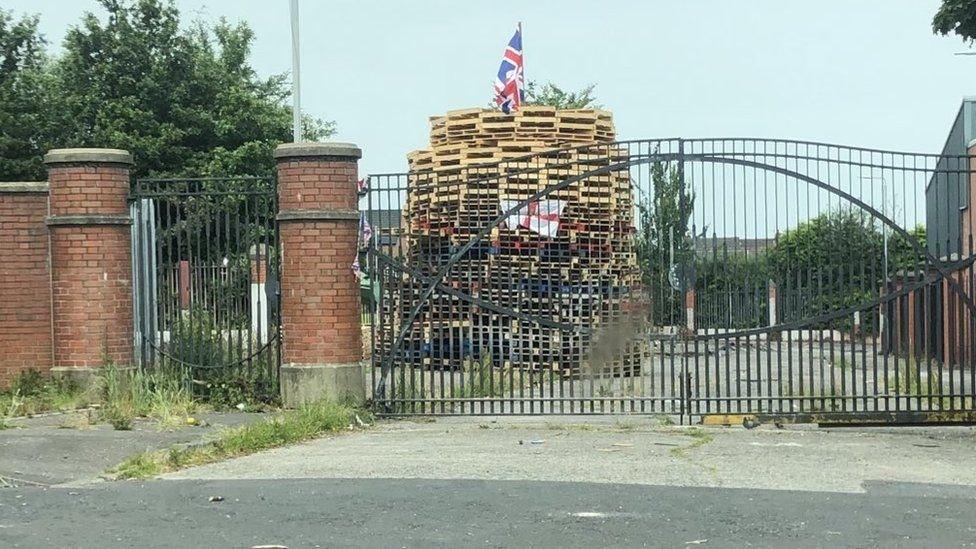Eleventh Night: What is the law on bonfires in Northern Ireland?
- Published

About 250 bonfires took place around the Eleventh Night across Northern Ireland this year, with the vast majority passing off without any problems.
But incidents at a small number - including a 17-year-old boy suffering burns to his face and body at a bonfire at Silverstream Crescent, Ballysillan - revived a debate about safety and regulation.
Some politicians have called for new rules, while others have argued that a legislative framework already exists and just needs to be implemented.
According to Dr Jonny Byrne, senior lecturer at Ulster University, rules are already in place that empower different public bodies.
While there no specific laws aimed directly at bonfires, legislation about things such as the environment, pollution, blocking roads and fly-tipping do apply.
Local authorities, the Department for Infrastructure, the police, the Northern Ireland Environment Agency and the Northern Ireland Fire and Rescue Service all have different powers they can use to regulate bonfires.

Bonfires are lit in unionist areas on 11 July to kick off the Twelfth celebrations
Councils
Councils can take action under a number of different pieces of legislation:
Litter (NI) Order 1994 - The power to give out an £80 fixed penalty notice for small-scale fly-tipping
Clean Air (NI) Order 1981, Clean Neighbourhoods and Environment Act (NI) 2011 - Focuses on controlling pollution and smoke, with the landowner responsible in some instances
Waste and Contaminated Land (NI) Order 1997 - Requiring landowners to removed controlled waste within 21 days; also gives council powers to remove waste deposited unlawfully
The Public Health (Ireland) Act 1878 - Gives the council powers to "abate nuisance", including around smoke
Belfast City Council said in a statement that it "does not regulate or grant permission for bonfires".
"Belfast City Council's approach to managing bonfires is led by elected members," it said.
"A member-led decision-making process has been agreed to consider issues and make decisions on a site by site basis."
Mid and East Antrim Borough Council, where the Craigyhill bonfire, one of the largest in Northern Ireland, is held, said its role was "to work closely with the local community and our partner agencies to encourage a safe and responsible approach to cultural celebrations throughout Mid and East Antrim".
Department for Infrastructure
The department can take action under the Roads (NI) Order 1993, which makes it an offence to leave items in the road which would "constitute a nuisance" and gives the department the power to remove them.
Under that law, the police also have a responsibility to stop smoke preventing visibility on a public road.
The department said it intervenes to remove materials from footways, which is something which happens "at many sites each year".
However, the removal of bonfire material from roads is normally "restricted to clear-up operations after the fires have been lit".
"The department's responsibilities for bonfires relate to the adopted road network and land that is owned by the department," it said.
"The department does not approve of bonfire material being stored or bonfires being located on the public road network or on adjoining land.
"These actions can put lives and property at risk, divert the emergency services from other important work and disrupts the travelling public."

Firefighters were on standby at the huge bonfire in Craigyhill in Larne and had to dampen their own truck due to the extreme temperatures
Police Service of Northern Ireland (PSNI)
Public Order (NI) Order 1997 - In some circumstances, it could make the burning of flags or posters an "offence of provocative conduct" although an intention to stir up hate or around fear needs to be proven
Criminal Damage (NI) Order 1977 - Makes it an offence to destroy or damage property
The police's role in regulating bonfires is tied in with the bodies they work alongside.
A spokeswoman told BBC News NI that the PSNI had "no specific legislative power to remove bonfires or waste which has been illegally disposed of at sites" but "will support other statutory agencies and landowners to carry out their role if required".
It also said it worked with community representatives to address "safety issues linked to bonfires".
Northern Ireland Environment Agency
The Waste and Contaminated Land (NI) Order 1997 gives the body power over waste management in Northern Ireland, including prosecuting for the illegal dumping of waste.
The Waste Management (2006) Regulations also make it illegal to deposit domestic waste in a way likely to harm the environment.
The Controlled Waste (registration of carriers and seizure of vehicles) Regulations (NI) 1999 makes a person handling controlled waste responsible for it being disposed of correctly, meaning a waste transfer notice is required for each time used tyres are moved.
A spokesperson for Department for Agriculture, Environment and Rural Affairs, which has responsibility for the Northern Ireland Environment Agency (NIEA), said it plays "an important role" in a multi-agency effort to to manage "serious environmental risks and harms surrounding bonfires".
It said the NIEA works to ensure bonfires "do not endanger life or property and the impact on the environment is minimised".
"We will, where it is safe to do so and with appropriate support from our partners, assist in the removal of waste tyres from bonfires sites or associated locations," the department said.
"We have and will continue to prosecute those who illegally dispose of waste tyres, however, it is difficult to trace the origin of waste tyres and unless there is sufficient evidence, such as an eyewitness account or CCTV footage, then identification and prosecution of the perpetrator is problematic.
"Therefore, our efforts are focused in trying to prevent such wastes reaching bonfire sites in the first instance.
"We routinely conduct inspections and audits of tyre retailers and garages to ensure those business are adhering to relevant 'duty of care' legislation and that waste tyres are lawfully disposed at appropriate facilities."
It said despite Covid restrictions, 84 inspections had been carried out in 2021.
It said in the past year, 29.36 tonnes of waste tyres had been removed at a cost of £11,447.
Northern Ireland Fire and Rescue
The Fire and Rescue Services (NI) Order 2006 grants power to do anything necessary to extinguish a fire.
A spokesperson said the service had no enforcement power in relation to bonfire materials being lit and that bonfire buildings did not have to seek any sort of permission from it.
In regards to putting a bonfire out if deemed necessary, the spokesperson said: "When responding to an incident involving a bonfire, the incident commander will develop a tactical plan based on any relevant information available at that time."

The Department for Infrastructure said it would intervene when it becomes aware of materials being stored on its adopted roads or lands
What is the way forward?
Dr Byrne believes that while a range of laws are in place it is crucial to define what a bonfire is and its importance to its community in order to regulate them in the future.
"We need to be clear what a bonfire means and represents in communities and that allows us to manage it moving forward," he said.
"If the aim is to protect the culture and the behaviours, the traditions, we need to look at new ways around protecting it.
"If the aim is around eradication, then the current legislation is in place.
"New legislation would be about protecting the culture."
Dr Byrne said it was inevitable that bonfires would continue to change but it would not be consistent across Northern Ireland.
"Some communities will change quicker than others - issues such as health and safety, changes to the built environment and community leadership will continue to transform the bonfire tradition.
"It is going to come down to if people feel safe, if the environment feels protected, if the homes need protected, if culture can be protected in a positive manner."
- Published11 July 2023

- Published7 July 2021
